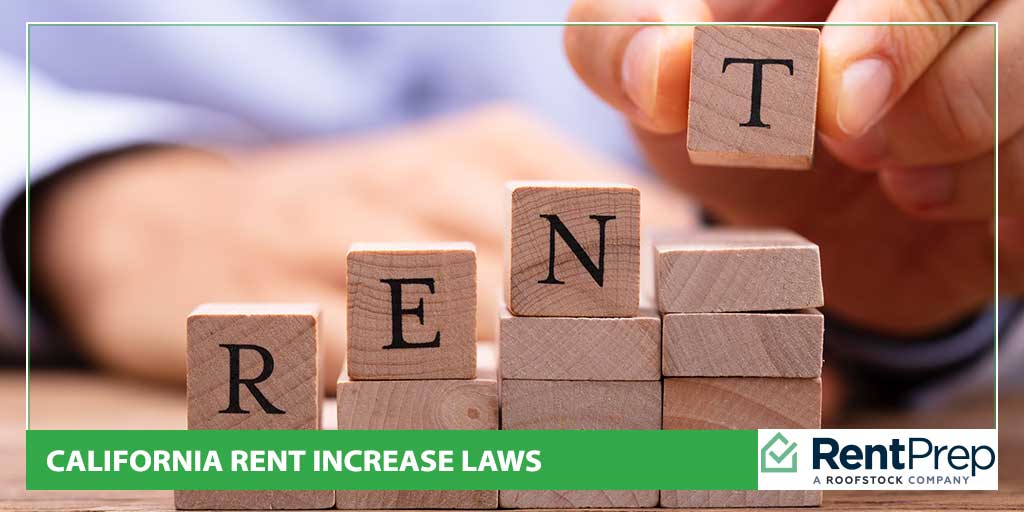
Updated November 2023
In recent years, California has seen significant changes in legislation impacting landlords and rental properties. Since the end of 2019, the state has implemented a series of laws that place restrictions on when, how often, and by how much landlords can raise rents, aiming to address the severe housing shortage and homelessness crisis. These laws essentially formalize existing local regulations aimed at combating these pressing issues.
But that’s not all – more changes are on the horizon. New laws designed to future-proof rental properties are currently in the pipeline, poised to reshape the rental landscape. For California landlords, staying informed about these evolving regulations is crucial for the health of your business.
In this comprehensive guide, we’ll walk you through the key aspects of the Tenant Protection Act of 2019, which primarily focuses on rent increase limitations. We’ll also delve into the latest laws that came into effect in 2023.
Please Note: RentPrep does not provide tax, legal or accounting advice. This material has been prepared for informational purposes only and is not intended to provide, and should not be relied on for, tax, legal or accounting advice. You should consult your own tax, legal, or accounting advisors.
Contents – California Rent Increase Laws
This article covers several California rent-related laws. You can skip to relevant sections using the contents list below.
- What Are Rent Increase Laws?
- Rent Increase Notice In California – Tenant Protection Act Of 2019
- Other Changes In Action
- New Laws For California Landlords Implemented In 2023
- Which Cities Have Individual Rent Control Laws In California?
- California Rent Increase Laws FAQs
- How Many Days Notice Must Be Given For Rent Increase In California?
- Can A Landlord Raise Rent After The Lease Expires In California?
- Can A Landlord Terminate A Month-To-Month Lease Without Cause In California?
- Can A Landlord Evict A Tenant To Increase Rent?
- Can Landlords Increase Rent For Improvements To The Property?
- Stay Informed With Rent Increase Law Changes
What Are Rent Increase Laws?
 The purpose of rent increase laws is to mandate when landlords can increase rent, how often, and by how much for existing tenants. They do not restrict how high landlords can set rent for new tenants.
The purpose of rent increase laws is to mandate when landlords can increase rent, how often, and by how much for existing tenants. They do not restrict how high landlords can set rent for new tenants.
Rent increase laws also mandate how much notice landlords must give tenants before increasing rent and indicate those groups who are exempt from rent increases.
These laws are designed to protect tenants from unreasonable price increases that can cause their rent to skyrocket and leave them in financial distress.
Rent increase laws may also have clauses that address rent-stabilized housing, but the overall rules about that type of housing situation are likely made clear in separate legislation.
Rent Increase Notice In California – Tenant Protection Act Of 2019
The Tenant Protection Act of 2019 (AB-1482) went into effect in California on January 1, 2020, and will remain in effect until 2030.
This legislation is a rent increase notice for the state, but many cities and municipalities have their own rent increase laws, some of which contradict the new state law. In that case, the local law takes precedence if it was passed before March 2019 or if it offers more beneficial conditions for tenants.
You can bookmark the complete law here, but below is a list of the key takeaways for landlords.
Updated Cap On Rent Increases
The law places a cap on how much rent can increase annually. It states that in any 12-month period, rent can be increased by a maximum of 10%, or by 5% plus the Consumer Price Index (CPI), the yearly change in the cost of living, whichever is lower.
In most parts of California, the CPI averages around 2.5%, which means the annual cap on rent increase would be 7.5%. This means you cannot raise the rent by more than 7.5% if you are in an area with 2.5% CPI.
These changes do not affect the maximum late fee for rent in California; you can still charge what is a reasonable amount and listed in the lease agreement.
Limited Increase Frequency
The bill also states that the rental rate can be raised no more than two times over any 12-month period. If you do raise the rent twice in 12 months, you still cannot raise the rent by more than the maximum annual cap.
Additionally, the tenant must have been in the rental for their complete lease term before rent can be raised at all.
“Just Cause” Lease Termination
 When a one-year lease ends in California, it automatically converts to a month-to-month lease unless you sign a new agreement with your tenant. Even though the initial lease period is over, the agreement automatically renews until the tenant moves out or there is just cause for lease termination.
When a one-year lease ends in California, it automatically converts to a month-to-month lease unless you sign a new agreement with your tenant. Even though the initial lease period is over, the agreement automatically renews until the tenant moves out or there is just cause for lease termination.
As a landlord, you must have a reason to terminate a lease agreement. Some landlords have been known to terminate a lease to avoid rent increase caps and charge higher prices. The bill requires just cause for lease termination to prevent this scenario.
Some examples of just cause include:
- Nonpayment of rent
- Criminal activity at the property
- Serious lease violation
- Preventing the landlord from entering the property under allowed circumstances
If you have just cause to end a lease, you will need to send a “notice of violation” and proceed with an eviction case.
But note that the law also states that a landlord must give a tenant three days’ notice to pay their overdue rent or leave the premises before filing an eviction notice.
No-Fault Terminations
This bill also introduces the idea of no-fault terminations to rental law in California. In a no-fault situation, this bill permits landlords to provide specific relocation assistance to tenants in order to regain full control of the property.
What is a no-fault situation? This is a situation in which you or a direct family member wants to live at the property, the property will be converted into a non-rental property, the property will be demolished or heavily remodeled, or the local government requires the tenant to move out.
These situations require a solid, justifiable reason for the tenant to have to move out at this time.
If you want a tenant to move out in a no-fault situation, you must do one of the following:
- Provide them with one month’s rent payment
- Waive the final month’s rent
Giving tenants this money is meant to enable them to quickly find another housing option in these less-than-ideal circumstances.
Rent Increase Exceptions
As with most bills, the Tenant Protection Act of 2019 has a few exceptions where the expanded law and limits do not apply.
In this case, the following exceptions to AB-1482 have been made. The law:
- Does not apply to properties built in the last 15 years
- Does not apply to condos and single-family homes unless owned by a corporation, real estate trust, or an LLC with a corporation member
- Does not apply to duplexes where the owner lives in one of the units
- Does not apply to mobile homes, commercial properties, hotels, college dorms, or schools
- Does not apply to rental properties managed by nonprofit organizations
Rent Increase Notice
When you decide to increase rent, there are rules about how much notice you must give to your tenant before the increase takes effect.
Normal Leases
In the case of a month-to-month tenancy or a long-term tenant who has lived at the property for more than one year, you must give at least 60 days’ notice before rent increases.
If the property is not covered by the rent increase law and the landlord increases the rent by more than 10%, the landlord must give the tenant at least 60 days’ notice.
Exemptions
If your property is exempt from the new rent increase rules and you can raise the rent by more than 10% at a time, you must give at least 90 days’ notice before a rent increase takes effect.
Other Changes In Action
In addition to the changes surrounding rent increases and rent control, some additional changes went into effect in California rental law in 2020.
- Section 8 Discrimination
A new law requires that landlords view Section 8 assistance as income. This means landlords will not be able to use a lack of income to deny Section 8 applicants. You can still use credit score or other parameters when choosing tenants. Download our tenant screening checklist here. - Military and Veteran Discrimination
Similarly, the law requires that housing vouchers given to military personnel or veterans be viewed as income. This will help them find housing more easily. - Security Deposits
California law allows the security deposit to equal two months’ rent for an unfurnished apartment and three months’ rent for a furnished apartment. This law limits those amounts to one and two months’ rent, respectively, for service personnel. Security deposits must be fully or partially reimbursed to the tenant within 21 days of the end of their lease. - Application Free
In 1998, the tenant application fee was capped at $30, which means that, in 2023, it is $55.85, adjusted for the Consumer Price Index. Landlords must provide an itemized list of their expenses for conducting the application checks. If the landlord or property manager does not use the application fee funds to conduct relevant checks, this fee must be returned to the applicant. - Homelessness
Tenants may shelter someone at risk of homelessness as long as it doesn’t violate the building code, even if their lease does not allow more roommates. The landlord may request additional compensation.
New Laws For California Landlords Implemented In 2023
In addition to the rent increase laws that came into force at the start of 2020, several new laws for landlords came into effect at the start of 2023. This is part of a government push to better regulate the rental industry.
The new 2023 laws primarily impact owners of single-family homes, condos/townhomes, and multi-family buildings with fewer than five units. The most important takeaways for landlords are listed below.
Offers On REO Properties
Bill AB 2170 requires any institution that forecloses on more than 175 properties per year to only accept offers from prospective owner-occupants, qualified nonprofits, government entities, or other affordable housing providers for the first 30 days that the real estate owned (REO) property is listed for sale.
Reusable Tenant Screening Reports
The bill AB 2559 creates the ability for tenant applicants to pay for one screening report that can then be used for multiple property applications to save money on application fees. They can provide the report directly as part of their application, or the landlord can access it through a verified online portal. It’s still up to landlords whether they accept these reports, and if they do, they cannot charge an application fee.
Termination Of Tenancies Based On Domestic Violence
Landlords are already required to allow a tenant who is the victim of domestic violence to break the lease with just 14 days’ notice. But the new law SB 1017 adds a penalty of up to $5,000 for landlords who fail to abide by this legal provision.
The same bill also introduces the idea of partial eviction, when the abuser in a relationship can be evicted. At the same time, the victim can remain in the property as a tenant if they wish. This is a new type of eviction, so it’s still unclear how the courts will manage it.
Mandatory EV Charging Stations
A bill, AB 1738, is currently in process to make electronic vehicle (EV) charging stations mandatory in new multi-family buildings of more than four units and some existing multi-family buildings. While it is unclear when this law will come into force, it’s something for landlords to prepare for.
Requiring Pets In Affordable Housing Units
The bill SB 971 has also not come into effect yet, but it is something landlords should prepare for. It states that pets are considered family members, so affordable housing units should allow at least one household pet without breed or size restrictions. Affordable housing landlords also cannot charge additional fees for pets.
Wage Garnishments
When a landlord wins a financial judgment against a tenant, the existing law allows the landlord to garnish the tenant’s wages with some limitations. Bill SB 1477 decreases the percentage of wages that can be garnished, making it more difficult and longer for landlords to collect from evicted tenants.
Which Cities Have Individual Rent Control Laws In California?
Various cities have their own rent control laws in California. These city laws supersede those of the state if they were passed before March 2019 or if a city’s laws provide more beneficial conditions for tenants.
The following cities have rent control laws:
- Alameda
- Berkeley
- Beverly Hills
- City of Commerce
- Culver City
- East Palo Alto
- Gardena
- Hayward
- Inglewood
- Los Angeles
- Los Gatos
- Mountain View
- Oakland
- Palm Springs
- Richmond
- Sacramento
- San Francisco
- San Jose
- Santa Monica
- Thousand Oaks
- Vallejo
- West Hollywood
California Rent Increase Laws FAQs
Below are answers to some of the most frequently asked questions about rent control laws in California.
How Many Days Notice Must Be Given For Rent Increase In California?
In California, the amount of time the notice must give depends on the property type, lease type, and rent increase amount:
- 90-day notice for all increases over 10%
- 60-day notice for all month-to-month or yearly leases with tenants who have lived there for more than one year
- 30-day notice for all month-to-month leases for tenants who have lived there for less than one year
- 30-day notice for all week-to-week leases
Local ordinances may require the landlord to give more notice in specific situations, so you should become familiar with your county or city’s landlord-tenant regulations as well as the state’s rules.
Can A Landlord Raise Rent After The Lease Expires In California?
Yes, you can raise the rent after the lease expires. Holdover tenants are considered to have a month-to-month contract with you. This means you can increase rent by either 5% plus the local CPI or by 10%. You must give the tenant 60 days’ notice and can only increase rent twice a year.
Can A Landlord Terminate A Month-To-Month Lease Without Cause In California?
Unless you have a no-fault reason for terminating the lease, such as moving into the property yourself, you cannot terminate a lease without cause.
Can A Landlord Evict A Tenant To Increase Rent?
Under the Tenant Protection Act of 2019, landlords cannot evict a tenant without just cause if the tenant has been in the unit for more than one year. Just cause can include at-fault reasons like nonpayment of rent or violation of lease terms, as well as no-fault reasons like owner move-in or withdrawal of the unit from the rental market, but generally cannot be for the purpose of increasing rent beyond the allowable limits.
Can Landlords Increase Rent For Improvements To The Property?
Under some local ordinances, landlords can petition to increase rent for capital improvements to the property. The specifics of how this works and what qualifies would be detailed in the local ordinance.
Stay Informed With Rent Increase Law Changes
The state of California and its cities have released a series of rental control laws since the end of 2019, and this is a trend likely to continue as the state deals with insufficient housing and a homelessness crisis.
Landlords operating in California should do their best to follow laws as they develop so as not to get caught by surprise. Looking ahead to upcoming laws, such as the requirement to provide EV charging stations and to allow pets in affordable housing, can help ensure you’re prepared for new changes that are just over the horizon.
You can access all of our California landlord resources here.

